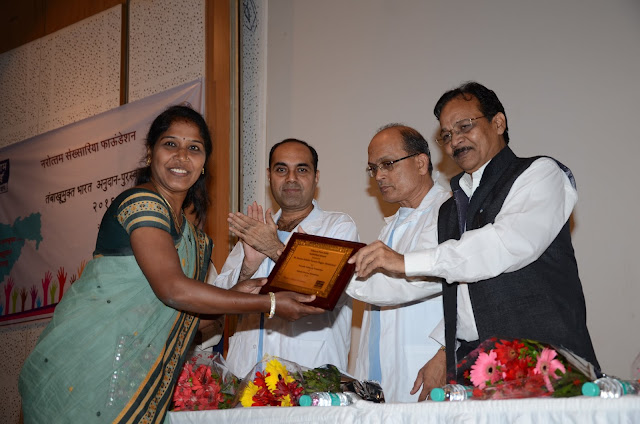

Narotam Sekhsaria Foundation awards grants to individuals and NGOs working at grassroots for tobacco-control at meet organised jointly with Salaam Mumbai Foundation, Tata Memorial Centre
Mumbai, September 21 2016: Rural Maharashtra is leading the crusade against tobacco with organisations and individuals from the grassroots taking up the cudgels to make the state free of the menace.
On Wednesday, five NGOs and three individuals from the state were honoured by the Salaam Mumbai Foundation and Narotam Sekhsaria Foundation at a ceremony held at the Tata Memorial Hospital in Parel. The event was organised in association with the Tata Memorial Centre and was part of Salaam Mumbai Foundation’s Tambakhu Mukt Maharashtra Abhiyan that aims to make Maharashtra a tobacco-free state.
Salaam Mumbai Foundation is the rural outreach programme of the NGO Salaam Bombay Foundation. It was started in the year 2007 with the primary objective of creating awareness about the health hazards of tobacco and in turn reducing consumption rates across the state. Ever since its inception, Salaam Mumbai Foundation has been harnessing the capacity of state and local institutions like Zilla Parishad schools, village health workers, aanganwadi and other public health workers appointed by the state government, gram panchayats, local NGOs, block and district level education officers and other local influencers. Its team was recently felicitated at the fourth state-level Vyasanmukti Sammelan by the Department of Social Justice and Empowerment, Maharashtra for its initiatives in Gondia district.
Eminent personalities including Social Justice Minister Shri Rajkumar Badole, Founder, Salaam Bombay Foundation Padmini Somani and Head & Neck Surgeon, Tata Memorial Hospital, Pankaj Chaturvedi, were present on the occasion.
The ceremony culminated in the awarding of special grants to the individuals and NGOs by the Narotam Sekhsaria Foundation. Narotam Sekhsaria Foundation had received a total of 36 applications – 18 for the NGO category and 18 for the individual category – for the Tobacco-free India awards and grants from across India. Of these, 7 NGOs and 14 individuals were from Maharashtra.
The state-level meet on Wednesday was attended by around 175 people from across the country not just to honour the work of the awardees, but also to join hands in taking forward the mission of Tambakhu Mukt Maharashtra Abhiyan.
Rajashree Kadam, VP, Operations, Salaam Bombay Foundation said, “Individuals as well as organisations are doing excellent work on tobacco control in the rural parts of Maharashtra where the consumption is high. Their work needs to reach more and more people. Hence, we invited diverse stakeholders from government departments and provided a platform for those with a common cause to come together and join hands mainly to work at the grassroot level.”
Leni Chaudhuri, Programme Head, Narotam Sekhsaria Foundation, “We initiated this programme of awarding grants to honour the work of those who are spreading the message of tobacco-control especially in areas where the issue has become a serious threat. Once the grant has been provided, we will continue to work closely with them through Salaam Mumbai Foundation because we want them to work on community-based issues while involving the community actively.”
Narotam Sekhsaria Foundation instituted this grant in 2010 to encourage NGOS and individuals from rural areas of Maharashtra to work in the field of tobacco control. 21 NGOs and 19 individuals have been awarded this grant so far. Those who have been awarded the grant will be required to undertake a holistic approach towards tobacco-control including participating in workshops organised by Salaam Mumbai Foundation, recruiting a full-time worker to demonstrate programmes at schools and in the villages, conducting workshops for teachers and sarpanch, conducting cluster coordinators’ meeting once in a year at district and block level etc.
About Salaam Bombay Foundation
Salaam Bombay children are typically 12 to 17-year-old, live in Mumbai’s over crowded slums, go to a government school, have multiple responsibilities and live a highly pressured, stressful childhood. Meager and fluctuating incomes typically force them out of the school system as soon as they are deemed capable of contributing to the family income or of doing domestic chores. Most become trapped in unskilled, low-paying jobs with few prospects for growth. It also deters their ability to stay in school, complete their education and contribute to the organized work force.
Given these ground realities, The Salaam Bombay Academy of the Arts is a refuge for children whose lives are bereft of opportunities and facilities, of creative spaces and personal attention. The Academy addresses the lack of life skills and vocational skills by bringing world-class training in dance, music and theatre to children in government schools. It plays a pivotal role in identifying latent talent and giving underprivileged children the opportunity to develop this talent. This increases their confidence and self-esteem and they are now encouraged to consider a vocation in the Arts, an option they could not avail of before.
Having trained over 1,240 children in the Arts, Salaam Bombay has expanded its skills training initiative to include 21st century employment relevant skills such as Retail Management, Hospitality, Mobile Repair, Home Appliance Repair, Hair Care and Beauty, amongst others. Children are equipped with skills designed to grab the attention of future employers. Now they can prepare for sustainable careers in the future while staying in school.
About Narotam Sekhsaria Foundation
Narotam Sekhsaria Foundation (NSF) is a foundation dedicated to empower not-for-profit organizations and social entrepreneurs to make a positive, lasting and sustainable impact on society by promoting excellence among individuals, improving the quality of life for socially and economically disadvantaged communities, and promoting and protecting Indian traditions. NSF has supported charitable and philanthropic initiatives and partnered with developmental enterprises in the areas of education, health and livelihood. The foundation is involved in cancer care and tobacco-control activities and is providing technical and financial support to LifeFirst
